I stand inside the dull colored lobby of the CCINN watching Jon through floor to ceiling windows as he unloads a large suitcase from the trunk of car. As the car drives off, he turns to make his away around the row of cars parked in the narrow space between the street and hotel entrance.
It's 7:30 AM on Sunday morning, but the temperature is already in the high seventies and the air is humid. The hotel lobby isn't much different, climate wise. As Jon hauls the black wheeled case up a steep ramp at the side of the steps he's greeted by the small gathering of foreigners waiting inside.
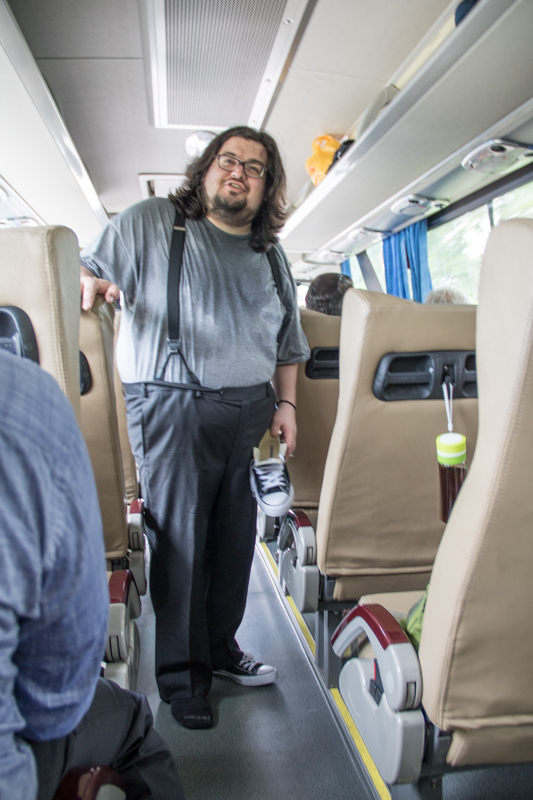
Jon's a big guy. He'd be intimidating if he wasn't so friendly. This morning he wears a grey t-shirt and black dress pants. The shirt is already soaked with sweat, a testament to how obnoxious the weather is.
"Ah, my favorite Russian," he says as he walks through the door and embraces a tall woman in a light blue dress. He greets a few others as he puts his bags down near the wall and heads upstairs to get more supplies.
The tall Russian introduces herself to me as Lina. Her hair is blonde with a slightly red tinge to it. Her dress is simple and lightweight, perfect for the oppressive weather. She'll change into something different later in the day.
I shake hands with a short Chinese woman named Amanda. Her voice is soft and mello without a hint of an accent. She's Canadian born, but her family moved to California when she was 12. For the last six years she's been living and working in Hong Kong. It throws me, to hear such perfect English from someone who could pass for a Chinese native.
Jon is the friend of a friend who I met once at a group dinner. He's American and today he is marrying a Chinese woman named Bee in a traditional Chinese wedding. I'm attending the celebration with three other UIC interns who have also befriended Jon (and also ordered Girl Scout cookies through him.)
The chartered bus that will take us from Zhuhai to an old village near Doumen parks two blocks from the hotel to wait for us. There's around twenty foreigners gathered in the hotel lobby and we all grab something to carry as we leave. We parade down the street, joking that we're probably the largest gathering of foreigners in the city.
The bus ride should be about 90 minutes, though we're off to a late start. The bus seats 40 or 50 people so there's plenty of room for us all to have our own row. I find myself sitting near the back door of the bus near Amanda, Victoria, and Victoria's two teenage daughters: Hailey and Shy (short for Shyanne).
Victoria is the wife of a groomsman and flew in from Arizona. Her two girls are the source of the imported Girl Scout cookies, (called Girl Guide Cookies in Canada, for no adequately explained reason.) Together we make up the quiet section of the bus, chatting and napping while the groomsmen and other passengers at the front of the bus begin the festive drive with beer and loud joking.

We arrive at a bridge that is out of service. Word on the street is that it was hit by a boat and is being repaired. Apparently this information was not passed along to the bus driver and he's now unsure where to go. He pulls into the dirt lot of what appears to be a disused factory to turn the bus around.
He drives back the way we came for a couple kilometers before pulling into a lot to turn around again.
"What is he doing?"
"He's going back to see if the bridge is fixed!"
The peanut gallery is three or four beers into the celebration. By now it's 11:30 AM, we're behind schedule, and everyone's a little antsy from our several hours of bus riding.
Instead of going back to the bridge, our driver parks the bus in the middle of a three-way intersection, effectively blocking a city bus that stopped at a stop sign. He gets out of our bus and steps aboard the city bus to talk with the city bus driver.
This is the type of thing you come to expect when living in China, and while it's entertaining for all of us, it's mind blowing for the guests who have only come to China for this wedding. Omar follows the driver out with the camera to capture video of the conversation. A few other passengers pop over as well.
A lucky pedestrian takes this opportunity to hop aboard the city bus, though this isn't one of the normal stops, though why that lady is walking out here, seemingly in the middle of nowhere, is another mystery.
Soon we are following the city bus and coming to a halt behind it as it picks up passengers at the bus stop.
"We should open our door and take on passengers!"
"We can give them a free ride and they can have a beer!"
"We can charge them ¥2 and give them a free beer."
Eventually our bus driver is able to pass the other bus, though this action doesn't inspire much confidence from the louder passengers either.
粉州村 - FenZhou Village
Old villages in China have narrow streets and are not suitable for large buses, which means we have to walk the final few kilometers to Bee's house. With the morning cloud cover gone the day has warmed up and it has not gotten any less humid.
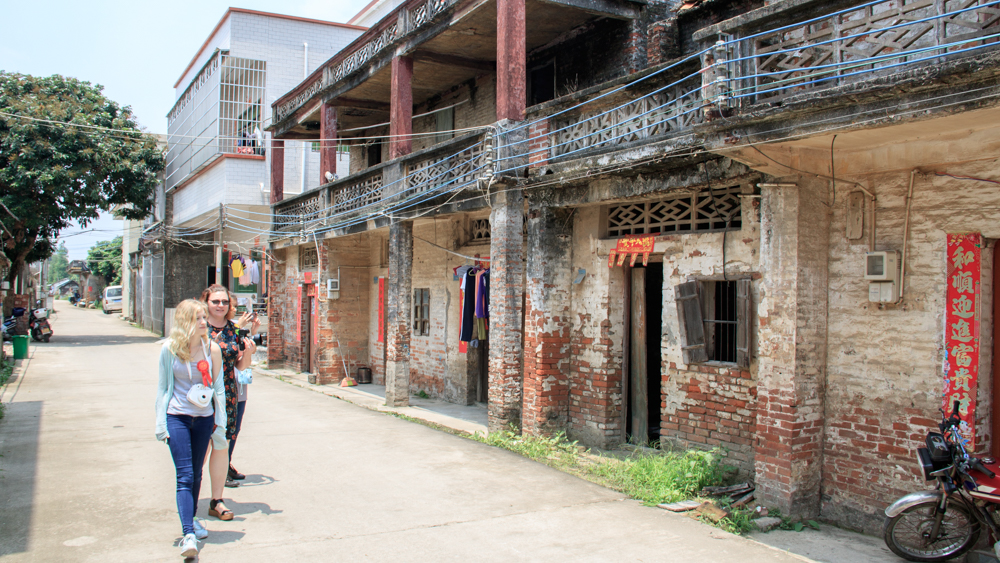
The Californians and Arizonians visiting China for the first time are treated to the sights, sounds, and smells of old China. The road is a collection of concrete slabs in various stages of disrepair. We walk past single and double story buildings, some of which are in the middle of being renovated. Others look like they could use some fixing up.
Renovations typically mean gutting the house of everything but the frame and rebuilding with concrete, plaster, and furnishings. It's a common sight when walking through Zhuhai to see a jumbled pile of wood, metal, and glass piled in front of open shop fronts. It looks as if all the buildings internals have been vacuumed out and dumped on the sidewalk.
Here, wooden doors hang on rusted hinges. It's difficult to tell what's a home and what's a storage shed. My Western senses can't tell if these buildings are still used for living spaces or not. I think an assumption either way could come across as culturally insensitive if not offensive.
Old Chinese men and women stare at us as we walk past. They sit in the shade of their open air buildings, heads slowly rotating as their eyes follow the throng of Westerners.
A traditional Chinese wedding doesn't have a "ceremony." There are no vows. But there are a lot of little ceremonial rituals that are typically observed. The first one on the agenda is "robbing of the bride."
I'm not sure if this is the right phrase for this event, but it's the phrase that was used throughout the day, so it's the one I'm using here. We were told that the groom and his men need to go into the house to get the bride, but the maids of honor (called sisters) will be outside the house running interference. It went down something like this:
Robbing of the Bride
The entryway to Bee's house is a metal door set in a white wall of concrete. By the time I arrive Jon and his groomsmen are already inside. Surrounding them on all sides are Chinese men, women, and children, all of whom are holding either cameras or cell phones.
Jon, a photographer himself, has two official photographers for the day, plus a handful of friends who brought DSLRs. There's a Chinese man with a giant Sony Camcorder recording the events onto VHS. VH-whaaat?
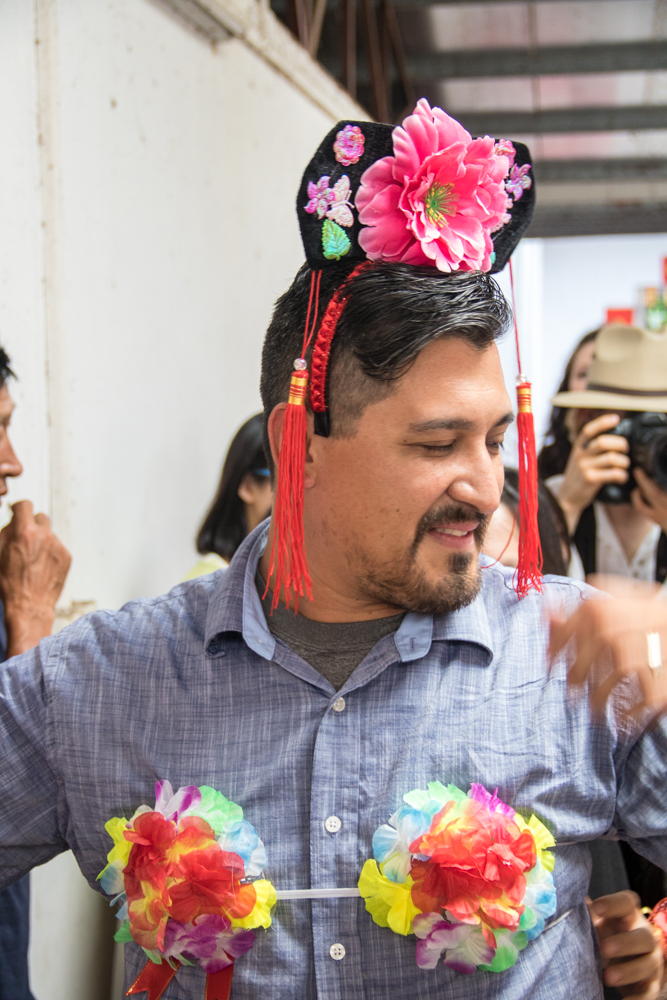
The groomsmen are being handed plastic hula skirts, flower braziers, and a cheap Chinese headdress. The room is about ten feet wide, fifty feet long, and crammed full of people. Above our heads is a tin roof, some three bladed fans, and a few bare fluorescent lightbulbs. The bulbs are surrounded by thick spider webs and covered in grime. The space is lit by a couple of translucent panels on the roof which act as skylights.
The men help each other to tie the loose fitting props over their button up shirts and around Jon's traditional red robe. Once they are properly attired they are instructed to dance. A couple of Chinese women hold their cell phones, screens out, toward the group of men.
"Dance," they yell.
From where I'm standing I can't really see the screen, but it sounds like the video in question is Little Apple by the Chopstick Brothers. When the music video stops showing dance moves the women continue to cheer the men on, telling them to "dance how you want!" "Freestyle!"
The performance is recorded from every conceivable angle by the attendees crammed into the small space. After a couple of minutes the required humiliation has been achieved and the bridal party is allowed to advance down the hallway.
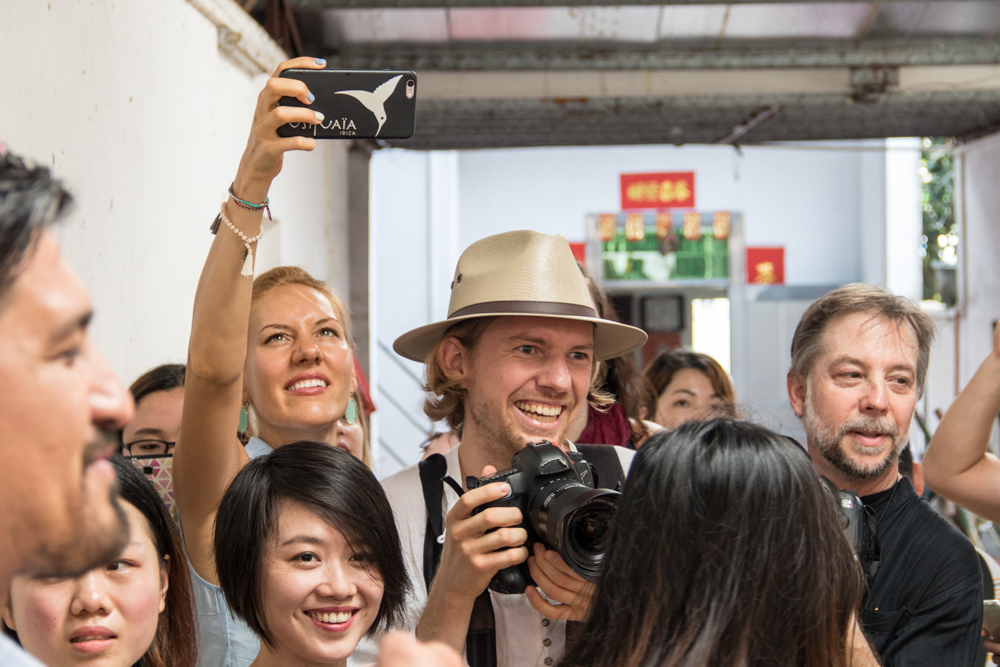
The hall is a long white room with a few modern looking wooden doors leading to rooms on the left. The right side of the room is lined with wheel borrows long caked over with dirt and dried cement. If houses in China have occupancy ratings we're currently exceeding them by multitudes measured in double digits.
About halfway down the hall the party encounters a second barrier. Someone needs to have a patch of hair on their arms waxed off. That someone turns out to be Tyrell, who is also serving as Jon's translator for the day. He gets a small patch waxed on both of his arms, saving the other groomsmen from a similar fate.
"Oh, this isn't that bad," he comments after it's done. He's quickly told by many of the women that he should be glad they didn't do his entire leg.
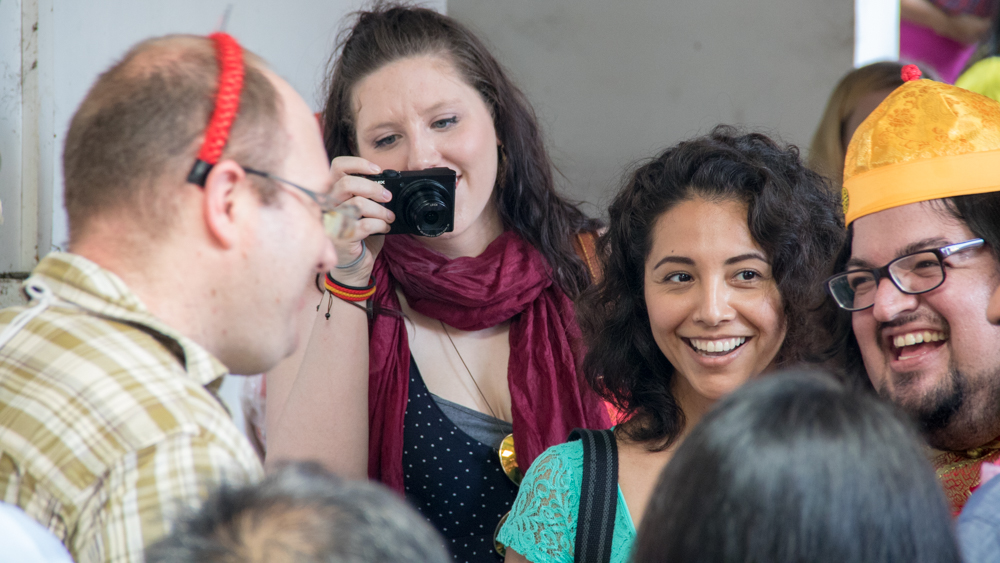
At the end of the hall a third challenge awaits. With large windows, a small stairway, and a balcony from above, the crowd is able to disperse slightly in order to find better angles for watching, filming, and snapping photos.
Jon is handed a bowl of food. It appears to be a cooked leafy green which might be cabbage. I don't know what it tastes like, but the party loudly bemoans the necessity to consume the greens. Jon feeds his helpers with chopsticks as they all share the burden of eating. As they reach the bottom of the bowl, Tyrell steps in and grabs the last few pieces with his bare hands and shoves them in his mouth. The crowd cheers appreciatively.
But that's not the end of the culinary torture. Each groomsmen is handed a plastic pouch with a chicken foot inside it. The slimy, boney, delicacy can be purchased at nearly any Chinese shop that sells snacks. It takes a special kind of person to like chicken feet and those are not the kind of people Jon asked to be his groomsmen.
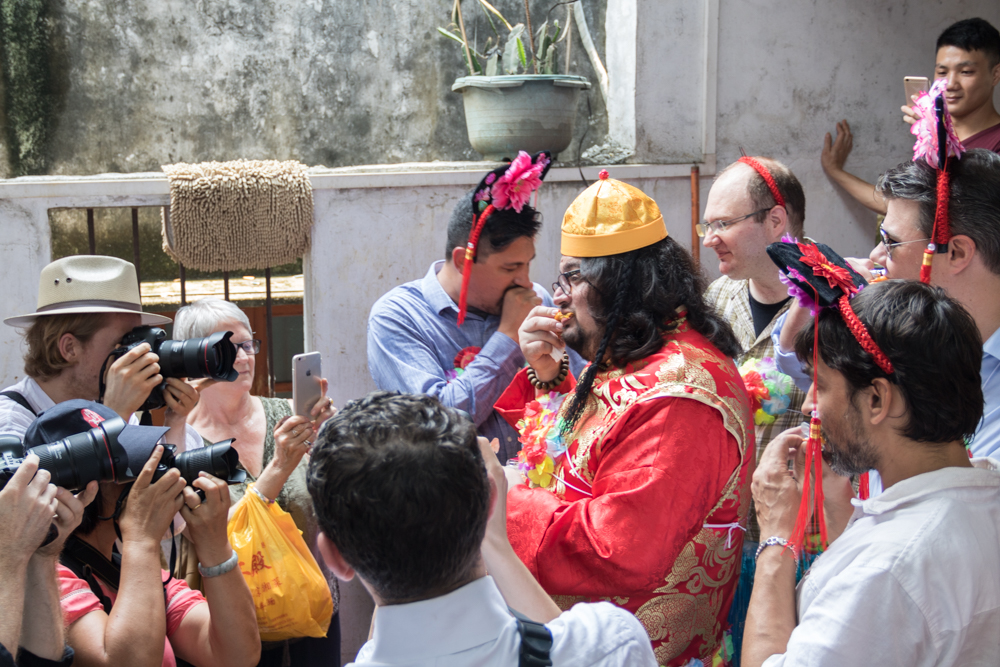
In a way, it's sweet. This is the low stakes equivalent of fighting a dragon to rescue a princess. It's a way for Jon to express his love for his future wife. "I'll do anything for you," is the underlying message. Jon helps to finish the feet for groomsmen who can't.
As Jon noms down on the last of the chicken, the party is told they have to pay a toll.
Jon starts handing small red packets to a women who opens each one, glances inside, and says "more, more!"
Red packets, in Chinese culture, are small envelopes which typically contain money and are given out at special events. There's a specific monetary value that Jon needs to meet before he's allowed to pass.
"More! More!" The Chinese women say.
One of the groomsman keeps hand Jon red packets, usually one or two at a time, all the while saying they are running out of packets. The envelopes are closed so they don't even know how much they are giving out with each packet. "More."
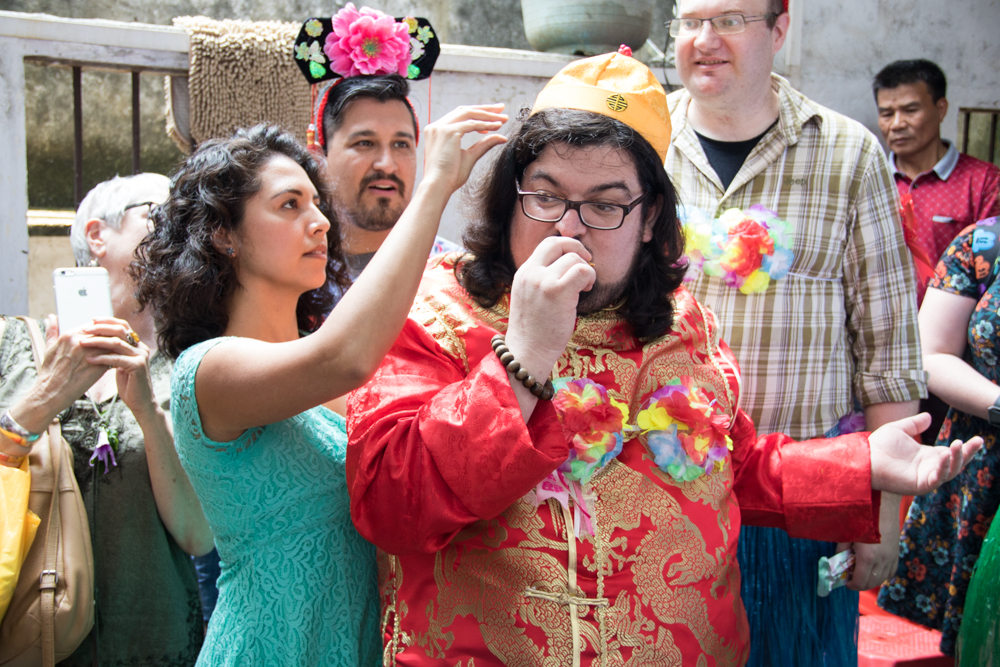
"Red bills, red bills!" Remminbi denominations vary in color, as well as physical size, with the largest bills being red and worth ¥100. The next couple of packets turn out to be small, green, ¥1 bills. There's some laughter.
The red packets keep flowing. This financial sum was prepared in advance by the family and given to Jon earlier in the day.
"We're just giving their money back to them," Jon tells one of the groomsmen. "Don't tell anyone."
It's all part of the ritual.
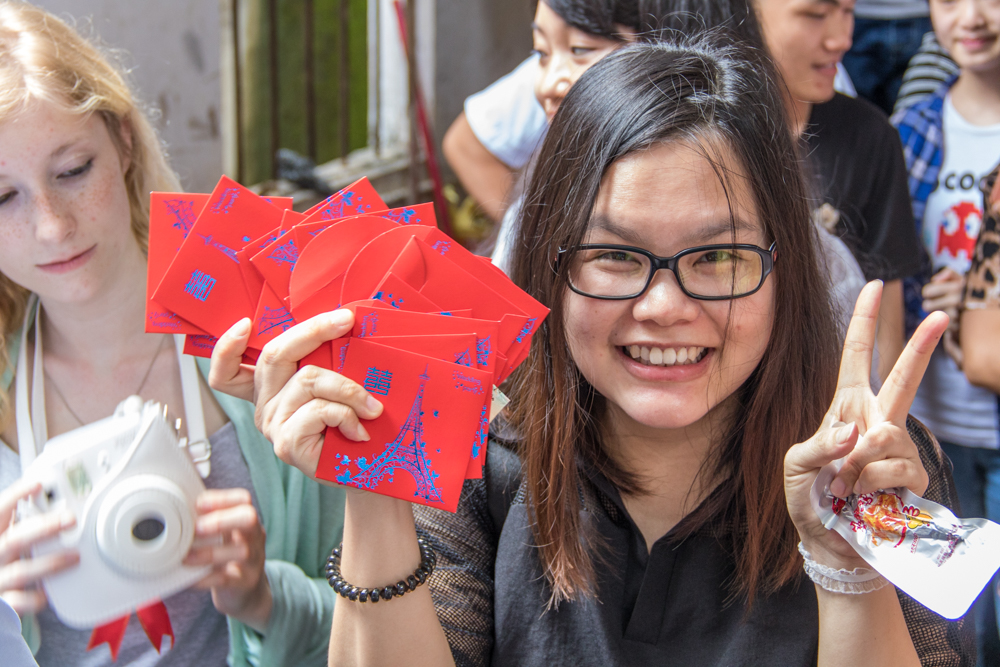
Jon is now mere feet away from the entrance to room where Bee awaits him. Yet he's still not done bribing the family. When the red packets are finally counted he still has to bribe the "brother" of the bride. I don't know if this is actually her brother or just a close male relative. Minorities in China are exempt from the One-Child Policy, but that only accounts for around 8% of the population. Sometimes Chinese will refer to close cousins as siblings.
Fortunately, there's a brown box containing six bottles of alchohol and a couple boxes of cigarettes in the corner. These, along with a small red envelope, are presented to the brother who welcomes Jon and his friends into the house.
The house Is no wider than the hallway leading up to it, and it's square. A three blade teal ceiling fan hangs from the tall ceiling, it spins rapidly creating a small breeze. Artwork fills the limited wallspace between doors and windows. The collections includes two landscapes and a large picture of Chairman Mao. A red couch takes up a large portion of floorspace on the right side of the room.
Two doors on the right lead off to side rooms, the second is the bride's bedroom. The party squeezes into the small space for the final challenge. Bee has lost, or more likely hidden, her shoes. Obviously, she can't leave home without them, so everyone must search for the footwear in order to save the wedding.
With such a large crowd, the search is more difficult than it might be if the space were empty, but I think that's part of the fun. The shoes are eventually found behind the bed.
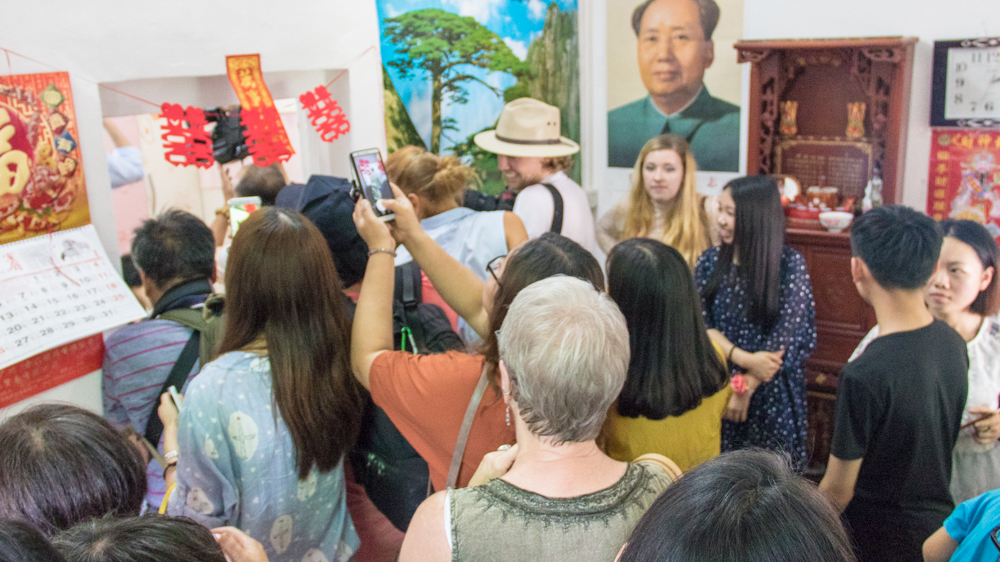
Ceremonies and Lucky Numbers
There's a customary Tea Ceremony that takes place at weddings, but today it's rushed. Not only are there certain little rituals that need to take place, but there's also "lucky times" for various things to happen. As the day slowly falls behind schedule there's a little discussion as to which lucky factors are more important. Events or times?
Someone sets off some firecrackers in the street. The sharp loud explosions echo off the concrete walls. The couple slowly walks back down the hallway to a white SUV waiting to transport to Doumen. We depart the village to head to Old Street in Doumen. This is where we'll spend the next couple of hours before the wedding banquet. It's a famous tourist spot with lots of little shops for souvenirs.
It rains during the bus ride back to the village and while it's mostly stopped by the time we arrive, the walk to dinner involves a lot of puddle dodging.
Two large long tents are setup on flat concrete space. A dilapidated basketball hoop provides insight into the other uses for this space. Round tables are setup in four rows with two rows per tent.
There's a small gap where the two tents meet, creating a "drip zone" from water running off the tent roofs. Water pools on the roof in a few spots where the tarp isn't pulled taught. Men prod at the hanging puddles using the red plastic stools around the tables to release the water.
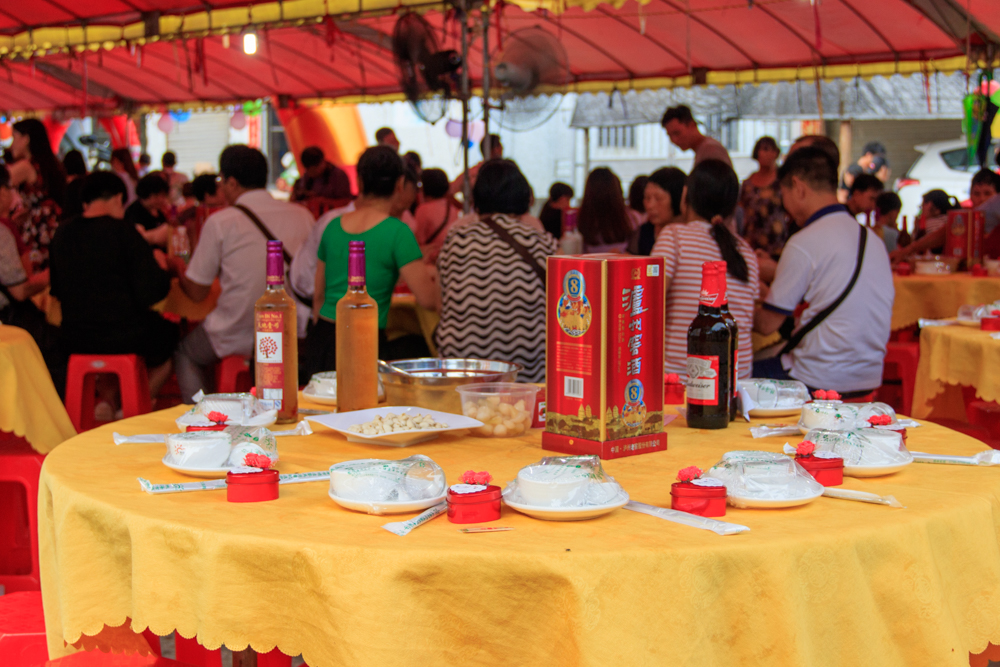
Each seat is equipped with a shrink wrapped dinnerware and a small heart shaped tin. The tin contains a few Chinese hard candies, a Jolly Rancher, and a Now and Later. Liter bottles of an apple cider vinegar and Budweiser beer sit next to ornate boxes of Bijou in the center of each table. The table cloths are gold in color and made of a stiff material that's feels neither like plastic or fabric.
An emcee dressed in a purple dress shirt grabs a microphone and starts talking to the crowd. The echo and reverb provided by the sound system create an illusion of a much larger arena. Nearly everything spoken is in Mandarin.
I present the newlyweds with a red packet, the money inside meant to cover the cost of dinner plus a little extra. The bride accepts the envelope and her assistant hands me a small one in return. When I open it later I find ¥10 inside.
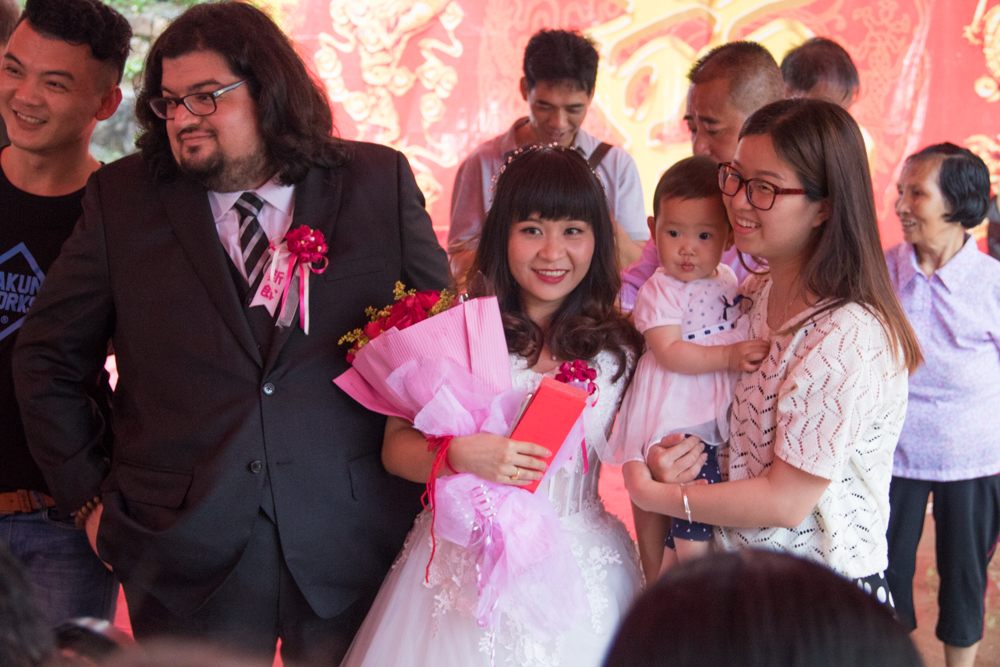
The meal is a typical family style dinner. 13 different dishes are brought to our table, including pork ribs, chicken, duck, eel, rice noodles, and porridge. The bride and groom make the rounds, taking a shot with each of the tables. There must have been over 30 tables of guests at the meal. Jon tells us they've been letting him take shots of water.
I'm sitting with a handful of other foreign guests. The two girl scouts don't seem very keen on trying the Chinese food and I offer them the pack of Oreos I have in my backpack. If I've learned one thing living in China it's to always carry emergency snacks.
When the meal ends people begin to leave. There's no after party, no dance, only a handful of group photos. Someone plugs in a phone with a playlist of pop music and Lina starts dancing solo as the remaining guests circle around her to take photos and video. She gracefully moves to the music, mixing salsa moves with freestyle. She's the center of attention and loves it. At one point we see her holding two babies and swaying to the music as parents take photos.
"Is she running for office?" Someone asks.
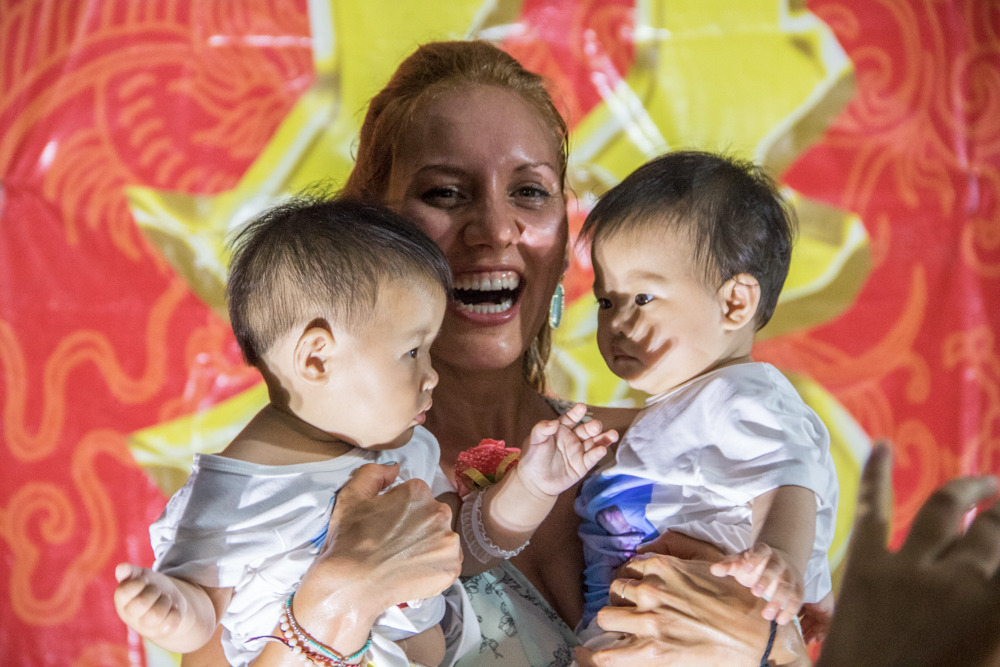
By 8:00 PM nearly everyone has cleared out and the cleanup crew is taking down tables. The ground is littered with empty bottles, discarded garbage, and spilled food. The contents of the tables have been scrapped into buckets; dishes, bottles, food, and all. The cleaning ladies start sweeping the concrete floor. The sound of empty glass bottles rolling across uneven concrete fills the silence after the music is turned off.
As things clear out we walk back to the bus. It's been a long day and some of us are ready for bed. It's an earlier night than many of us anticipated. For those of us working on Monday morning, we're happy to be heading home at a reasonable hour. Those still interested in partying go to a KTV place near the hotel in Zhuhai.
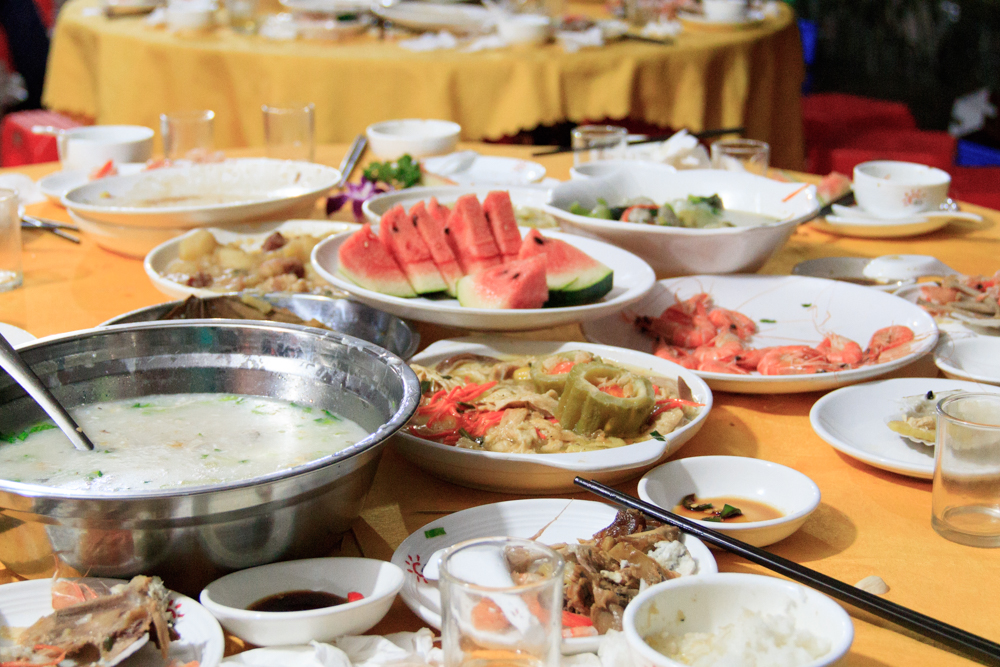
And that, is a traditional Chinese Wedding.
